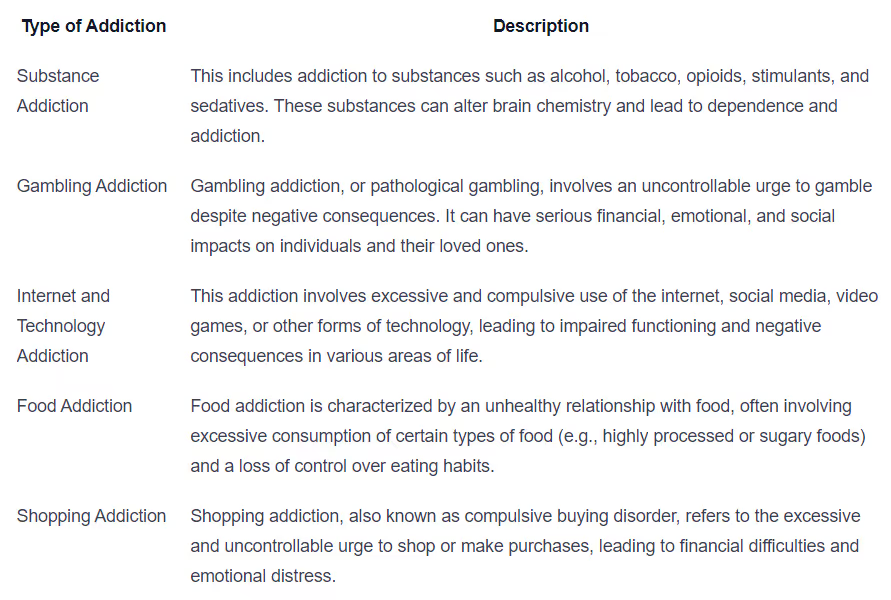Narcan Efforts in Bucks County

Understanding Addiction
In order to fully comprehend the efforts being made to address addiction, it is important to first understand what addiction is and the common types of addictions that exist.

Definition of Addiction
Addiction, also referred to as substance use disorder, is a chronic, relapsing condition characterized by compulsive drug or alcohol use despite negative consequences. It is recognized as a complex brain disorder that affects the individual's behavior, cognition, and physical health. Addiction is often accompanied by cravings, an inability to control substance use, and a tendency to prioritize drug or alcohol use over other aspects of life.
Common Types of Addictions
Addiction can manifest in various forms, involving different substances and behaviors. Some of the most common types of addictions include:

It's important to note that addiction can affect individuals from all walks of life, regardless of age, gender, or socioeconomic status. Understanding the nature of addiction and its different manifestations is crucial in developing effective strategies for prevention, intervention, and treatment.
Impact of Addiction
When it comes to addiction, its impact extends beyond the individual struggling with substance abuse. Addiction can have both personal effects on the individual and social consequences that affect the broader community.
Personal Effects
Addiction takes a toll on the physical, mental, and emotional well-being of the person affected. The personal effects of addiction can include:
- Physical Health Issues: Substance abuse can lead to a range of physical health problems, including liver damage, cardiovascular issues, respiratory problems, and increased susceptibility to infections and diseases.
- Mental Health Challenges: Addiction often coexists with mental health disorders such as anxiety, depression, and bipolar disorder. Substance abuse can exacerbate these conditions and make it more difficult for individuals to manage their mental well-being.
- Financial Consequences: Addiction can strain an individual's finances, as they may spend a significant amount of their income on obtaining drugs or alcohol. This can lead to financial instability, debt, and a reduced ability to meet basic needs.
- Relationship Strain: Addiction can cause strain and breakdown in personal relationships, including conflicts with family members, friends, and romantic partners. Trust issues, broken promises, and emotional distance are common in relationships affected by addiction.
Social Consequences
Addiction doesn't just impact the individual; it also has social consequences that extend to the community. Some of the social consequences of addiction include:
- Increased Crime Rates: Substance abuse is often associated with criminal activities such as theft, drug trafficking, and violence. Addiction can contribute to an increase in crime rates within a community, leading to a sense of insecurity and a strain on law enforcement resources.
- Financial Burden: The societal costs of addiction are substantial. These costs include expenses related to healthcare, treatment programs, law enforcement, and lost productivity in the workforce. Communities may bear the financial burden of addressing the consequences of addiction.
- Breakdown of Social Networks: Addiction can disrupt social networks and support systems. Friends and family members may distance themselves from an individual struggling with addiction, leading to feelings of isolation and further exacerbating the challenges faced by the individual.
- Stigma and Discrimination: Despite progress in understanding addiction as a medical condition, stigma and discrimination towards individuals with addiction still exist. This can hinder individuals from seeking help and accessing support, further perpetuating the cycle of addiction.
Understanding the personal effects and social consequences of addiction highlights the urgent need for effective prevention, treatment, and support systems in addressing this complex issue. By recognizing the multifaceted impact of addiction, communities can work towards implementing comprehensive strategies to support individuals and reduce the overall burden of addiction on society.
Treatment Options
When it comes to addressing addiction, there are various treatment options available that can help individuals on their path to recovery. Two common approaches to addiction treatment are therapy and counseling, as well as medication-assisted treatment.
Therapy and Counseling
Therapy and counseling play a vital role in addiction treatment by addressing the underlying causes and triggers of addiction, as well as providing individuals with the necessary tools and coping mechanisms to overcome their addiction. These treatment modalities can be conducted in individual, group, or family settings, depending on the specific needs of the individual.
Therapy and counseling sessions typically involve discussions with trained professionals, such as psychologists, therapists, or counselors. These sessions provide a safe and supportive environment for individuals to explore their thoughts, emotions, and behaviors related to addiction. By gaining a deeper understanding of themselves and their addiction, individuals can develop healthier coping strategies and make positive changes in their lives.
Cognitive-behavioral therapy (CBT) and motivational interviewing (MI) are two commonly used therapeutic approaches in addiction treatment. CBT focuses on identifying and changing negative thought patterns and behaviors associated with addiction, while MI aims to enhance an individual's motivation and commitment to recovery.
Medication-Assisted Treatment
Medication-assisted treatment (MAT) is another effective approach to addiction treatment, particularly for opioid and alcohol addiction. MAT combines the use of FDA-approved medications with counseling and behavioral therapies to address addiction.
The medications used in MAT help to reduce withdrawal symptoms, cravings, and the risk of relapse. They work by either blocking the effects of drugs or by reducing the pleasurable sensations associated with substance use. Alongside medication, counseling and therapy provide individuals with the necessary support and guidance to make lasting changes in their lives.
MAT has been shown to be effective in improving treatment outcomes, reducing drug use, and decreasing the risk of overdose. It can be an essential component in comprehensive addiction treatment, enabling individuals to stabilize their lives and focus on their recovery.
It's important to note that the specific treatment approach should be tailored to meet the individual needs of each person seeking recovery. Some individuals may benefit from a combination of therapy and medication-assisted treatment, while others may find success with one approach over the other. The ultimate goal of treatment is to provide individuals with the tools and support they need to achieve and maintain long-term recovery.
Support Systems
When it comes to addiction recovery, having a strong support system is crucial for individuals seeking to overcome their struggles. Support can come from various sources, such as family members and peer support groups. These support systems play an important role in providing encouragement, understanding, and guidance throughout the recovery journey.
Family Support
Family support is often considered an integral part of addiction recovery. The love, understanding, and encouragement from family members can make a significant difference in an individual's recovery process. Family support can take different forms, including emotional support, attending therapy sessions together, and actively participating in the individual's recovery plan.
By involving the family in the recovery process, individuals with addiction can benefit from a network of support that helps them navigate challenges and maintain their motivation to stay sober. Family members can also play a role in identifying potential triggers or relapse signs, providing a safe and stable environment, and promoting open communication.
Peer Support Groups
Peer support groups are another valuable resource for individuals in addiction recovery. These groups provide a sense of community and understanding, as they consist of individuals who have experienced similar struggles. Being able to connect with others who have firsthand experience with addiction can offer a unique level of support and empathy.
One well-known peer support group is Alcoholics Anonymous (AA), which follows a 12-step program to support individuals recovering from alcohol addiction. Other groups, such as Narcotics Anonymous (NA) and SMART Recovery, offer similar support tailored to different types of addiction. These groups provide a safe space for individuals to share their experiences, learn from others, and receive guidance from those who have successfully overcome addiction.
Peer support groups can offer a non-judgmental environment where individuals can openly discuss their challenges, seek advice, and find motivation to continue their recovery journey. It's important to note that participation in these groups is voluntary and confidential, allowing individuals to feel comfortable sharing their thoughts and emotions.
By tapping into both family support and peer support groups, individuals in addiction recovery can build a strong network of support that aids them in staying motivated, accountable, and focused on their path to sobriety. These support systems can provide the necessary tools and encouragement to navigate the ups and downs of recovery and lead a healthier, addiction-free life.
Narcan Efforts
Narcan, also known by its generic name naloxone, plays a crucial role in addressing opioid overdoses and saving lives. In this section, we will explore what Narcan is and the initiatives in place in Bucks County to combat opioid overdoses.
Narcan: What is it?
Narcan is a medication that can rapidly reverse the effects of an opioid overdose. It works by binding to the opioid receptors in the brain, displacing the opioids and temporarily blocking their effects. This action helps to restore normal breathing and prevent further harm to the individual experiencing an overdose.
Narcan is available in different forms, including nasal sprays and injectable formulations. These forms make it accessible and easy to administer, even for individuals without medical training. It is important to note that Narcan is not a treatment for addiction but rather an emergency intervention to prevent fatal overdoses.
Narcan Initiatives in Bucks County
Bucks County has implemented various initiatives to increase access to Narcan and combat opioid overdoses. These efforts aim to save lives and connect individuals struggling with addiction to the necessary resources for recovery.
One example of a Narcan initiative in Bucks County is the distribution of Narcan kits to community members and first responders. Organizations and agencies provide training on how to recognize the signs of an overdose and administer Narcan effectively. By equipping individuals with Narcan, they become empowered to respond quickly in emergency situations and potentially save lives.
Additionally, Bucks County has established partnerships with pharmacies to increase the availability of Narcan. Through these collaborations, individuals can obtain Narcan without a prescription, making it more accessible to those who may need it in emergency situations.
Moreover, education and awareness campaigns are conducted to educate the community about the signs of opioid overdose and the proper use of Narcan. These campaigns aim to reduce the stigma surrounding addiction, promote understanding, and encourage individuals to seek help for themselves or their loved ones.
The collaborative efforts in Bucks County, including the distribution of Narcan kits, accessibility through pharmacies, and educational campaigns, contribute to a comprehensive approach towards combating opioid overdoses. By addressing both prevention and emergency response, these initiatives strive to create a safer community and support those affected by addiction.
References
Narcan Efforts in Bucks County
